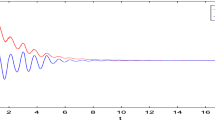Abstract
This paper addresses the stability problem associated with a class of switched positive nonlinear systems in which each vector field is homogeneous, cooperative, and irreducible. Instead of using the Lyapunov function approach, we fully establish the invariant ray analysis method to establish several stability conditions that depend on the states, rays, and/or times. We illustrate the efficiency of our proposed approach using the example of a chemical reaction.
Similar content being viewed by others
References
Farina L, Rinaldi S. Positive Linear Systems. New York: Wiley, 2000
Silva-Navarro G, Alvarez-Gallegos J. Sign and stability of equilibria in quasi-monotone positive nonlinear systems. IEEE Trans Automat Contr, 1997, 42: 403–407
Shim H, Jo N H. Determination of stability with respect to positive orthant for a class of positive nonlinear systems. IEEE Trans Automat Contr, 2008, 53: 1329–1334
Haddad W M, Chellaboina V S. Stability and dissipativity theory for nonnegative dynamical systems: a unified analysis framework for biological and physiological systems. Nonlin Anal-Real World Appl, 2005, 6: 35–65
Feyzmahdavian H R, Besselink B, Johansson M. Stability analysis of monotone systems via max-separable Lyapunov functions. IEEE Trans Automat Contr, 2018, 63: 643–656
Ngoc P H A. A Perron-Frobenius theorem for a class of positive quasi-polynomial matrices. Appl Math Lett, 2006, 19: 747–751
Lemmens B, Nussbaum R. Nonlinear Perron-Frobenius Theory. Cambridge: Cambridge University Press, 2012
de Leenheer P, Aeyels D. Stability properties of equilibria of classes of cooperative systems. IEEE Trans Automat Contr, 2001, 46: 1996–2001
Aeyels D, de Leenheer P. Extension of the Perron-Frobenius theorem to homogeneous systems. SIAM J Control Opt, 2002, 41: 563–582
Mason O, Verwoerd M. Observations on the stability properties of cooperative systems. Syst Control Lett, 2009, 58: 461–467
Liberzon D. Switching in Systems and Control. Boston: Birkhauser, 2003
Sun Z, Ge S S. Stability Theory of Switched Dynamical Systems. Berlin: Springer, 2011
Hespanha J P. Uniform stability of switched linear systems: extensions of LaSalle’s invariance principle. IEEE Trans Automat Contr, 2004, 49: 470–482
Zhao J, Hill D J. On stability, L 2 gain and H ∞ control for switched systems. Automatica, 2008, 44: 1220–1232
Zhao X, Zhang L, Shi P, et al. Stability and stabilization of switched linear systems with mode-dependent average dwell time. IEEE Trans Automat Contr, 2012, 57: 1809–1815
Yang H, Jiang B, Cocquempot V. Stabilization of Switched Nonlinear Systems With Unstable Modes. Berlin: Springer, 2014
Yang H, Jiang B, Tao G, et al. Robust stability of switched nonlinear systems with switching uncertainties. IEEE Trans Automat Contr, 2016, 61: 2531–2537
Liu X, Zhao Q, Zhong S. Stability analysis of a class of switched nonlinear systems with delays: a trajectory-based comparison method. Automatica, 2018, 91: 36–42
Ma R C, An S, Fu J. Dwell-time-based stabilization of switched positive systems with only unstable subsystems. Sci China Inf Sci, 2019. doi: https://doi.org/10.1007/s11432-018-9787-9
Zeng X, Lin W, Yang Z, et al. Linear invariant generation for verification of nonlinear hybrid systems via conservative approximation. Sci China Inf Sci, 2017, 60: 039102
Ogura M, Preciado V M. Stability of spreading processes over time-varying large-scale networks. IEEE Trans Netw Sci Eng, 2016, 3: 44–57
Colaneri P, Middleton R H, Chen Z, et al. Convexity of the cost functional in an optimal control problem for a class of positive switched systems. Automatica, 2014, 50: 1227–1234
Hernandez-Vargas E A, Colaneri P, Middleton R H. Switching strategies to mitigate HIV mutation. IEEE Trans Contr Syst Technol, 2014, 22: 1623–1628
Mason O, Shorten R. On linear copositive lyapunov functions and the stability of switched positive linear systems. IEEE Trans Automat Contr, 2007, 52: 1346–1349
Liu X, Dang C. Stability analysis of positive switched linear systems with delays. IEEE Trans Automat Contr, 2011, 56: 1684–1690
Blanchini F, Colaneri P, Valcher M E. Co-positive Lyapunov functions for the stabilization of positive switched systems. IEEE Trans Automat Contr, 2012, 57: 3038–3050
Wu Z R, Sun Y G. On easily verifiable conditions for the existence of common linear copositive Lyapunov functions. IEEE Trans Automat Contr, 2013, 58: 1862–1865
Zhao X, Zhang L, Shi P, et al. Stability of switched positive linear systems with average dwell time switching. Automatica, 2012, 48: 1132–1137
Zhao X, Liu X, Yin S, et al. Improved results on stability of continuous-time switched positive linear systems. Automatica, 2014, 50: 614–621
Pastravanu O C, Matcovschi M H. Max-type copositive Lyapunov functions for switching positive linear systems. Automatica, 2014, 50: 3323–3327
Lian J, Liu J. New results on stability of switched positive systems: an average dwell-time approach. IET Contr Theor Appl, 2013, 7: 1651–1658
Zhang J S, Wang Y W, Xiao J W, et al. Stability analysis of switched positive linear systems with stable and unstable subsystems. Int J Syst Sci, 2014, 45: 2458–2465
Haddad W M, Chellaboina V, Nersesov S G. Hybrid nonnegative and computational dynamical systems. Math Problems Eng, 2002, 8: 493–515
Dong J G. Stability of switched positive nonlinear systems. Int J Robust Nonlin Control, 2016, 26: 3118–3129
Bacciotti A, Rosier L. Liapunov Functions and Stability in Control Theory. Berlin: Springer-Verlag, 2005
Smith H L. Monotone Dynamical Systems: An Introduction to the Theory of Competitive and Cooperative Systems. Providence: American Mathematical Society, 1995
Sauer T. Numerical Analysis. 2nd ed. New York: Pearson Education, Inc., 2012
Lakshmikantham V, Leela S. Differential and Integral Inequalities: Theory and Applications: Volume I: Ordinary Differential Equations. New York: Academic Press, 1969
Rosier L. Homogeneous Lyapunov function for homogeneous continuous vector field. Syst Control Lett, 1992, 19: 467–473
Hill C G. An Introduction to Chemical Engineering Kinetics and Reactor Design. Hoboken: John Wiley and Sons, 1977
Acknowledgements
This work was supported by National Natural Science Foundation of China (Grant Nos. 61622304, 61773201), Natural Science Foundation of Jiangsu Province (Grant No. BK20160035), and Fundamental Research Funds for the Central Universities (Grant Nos. NE2014202, NE2015002).
Author information
Authors and Affiliations
Corresponding author
Rights and permissions
About this article
Cite this article
Yang, H., Zhao, X. & Jiang, B. Stability analysis of switched positive nonlinear systems: an invariant ray approach. Sci. China Inf. Sci. 62, 212206 (2019). https://doi.org/10.1007/s11432-018-9897-8
Received:
Accepted:
Published:
DOI: https://doi.org/10.1007/s11432-018-9897-8



